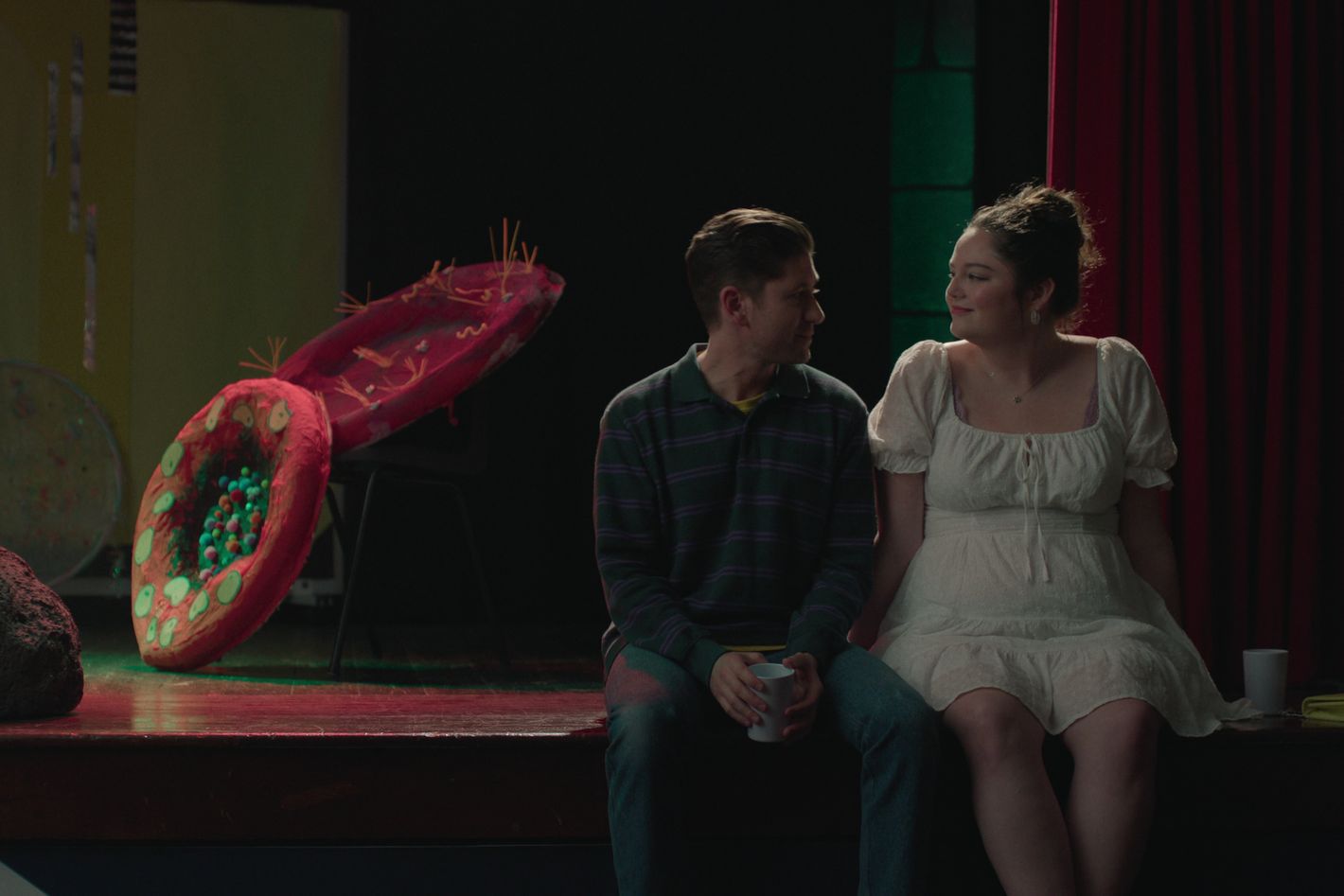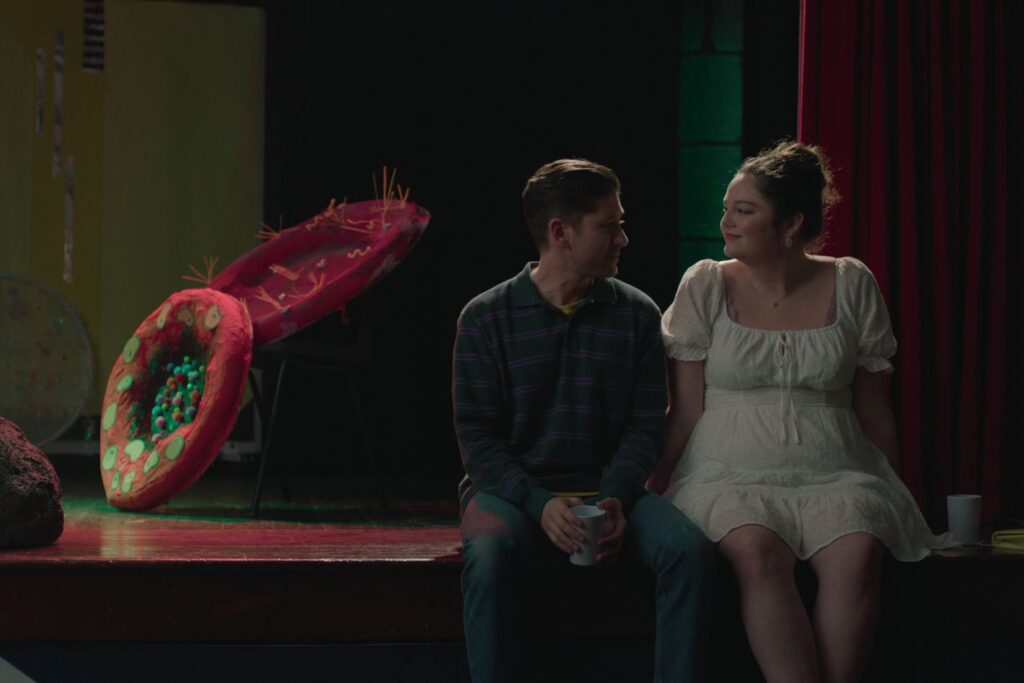
After half a season of 30-minute episodes, “Pink Valentine” gives us an hour-long tour through Jess’s former life with Zev. If “Ignore Sunrise” stretched the getting-to-know-you montage, “Pink Valentine” reverse-engineers it: We get a compressed version of how things fell apart. Shit does hit the fan between Jess and Felix, as predicted, but not in the expected ways.
Earlier in the season, I brought up what I perceived as Too Much’s sacrifice of character for plot. I’ll admit, I spoke too soon: “Pink Valentine” is all character. Every element of it works to give us an unabridged version of Jessica Salmon, from her doomed relationship with Zev to her family dynamics and her insecurities. So far, Jess’s kooky behavior had been met mostly with impunity — Felix saw beauty in her all the time, even when she acted crazy after Jonno’s, even when she set herself on fire. In “Pink Valentine,” for the first time, her crazy behavior is just crazy. It’s not funny, cute, or cool; it’s just sad. But it is Jessica.
During the first third of this episode, I was thinking that as frustrating as Jess can be — self-absorbed and out of touch and with her priorities out of whack — you can’t blame a woman for going berserk after being left for someone who looks like Emily Ratajkowski and, later, when it turns out the new guy you’re obsessed with is best friends with someone who looks like Adèle Exarchopoulos. The French actress plays the Polly of ass-tattoo infamy; she comes attended by two other Pollys, all of them close to Felix.
Jess meets the Pollys at the “Hackney Donkeyfest,” where Felix’s band has a gig. Like the dinner at Jonno’s, it’s another test of sorts for the couple, only this time it’s Jess who’s dropping in on Felix’s world. Felix leaves Jess with the Pollys as he sets up with his band, and she immediately resolves to find out which one of them is honored on Felix’s ass. The answer comes to her unbidden — as Polly One (Exarchopoulos) leans over the bar, Jess sees the name FELIX tramp-stamped on her back. Jess loses all grip. She asks Polly if she and Felix used to fuck, and Polly replies — in that laissez-faire French way — that they were “lovers” for 10 years before realizing they could love each other better as friends. Nothing about this makes sense to Jess.
In the meantime, Felix is consumed by the goings-on of the band, and he all but ignores Jess. The Pollys tell her that as far as they know, Felix is not sober, and the revelation, which, at the end of the episode, he maintains is not true, on top of her whiplash memory of breaking into Zev’s, is enough to convince her to do ketamine. She was trying to keep up the sober act, presumably in solidarity with Felix, but when it becomes obvious that nothing about this night is going her way, she officially throws caution to the wind. Polly One tries to get through to her by saying that there’s nothing for Jess to be jealous about — her and Felix brought out the worst in each other, and they are better as friends than they ever were together. Jess tries to concentrate on what she’s saying, but through her intoxicated eyes, Polly has morphed into a cat.
It’s gut-wrenching to watch the Pollys watching Jess, whom they immediately blame for “killing the vibe.” At Donkeyfest, all of Jess’s insecurity-based fears come true: not only are these girls cooler than her, and closer to Felix, they have little interest in getting to know her. That said, it’s hard to feel too bad for Jess; it’s not like she wants to get to know the Pollys, either. It’s exciting to meet people from different orbits of your lover’s life because you get to see sides of them that had been unknown to you before, but Jess can muster up little interest in Felix’s life before she arrived. She’s more focused on securing her own position.
It’s impossible to know for sure whether, when Polly Three sends Jess home, she’s acting out of the goodness of her heart (she’s kind enough helping Jess through her freak-out) or if she’s just being a bitch; but either way, she suggests that Jess lie down with a fluffy pillow and “walk through her memory.” When she gets home, that’s what Jess does. She tries Felix’s number a couple of times — forgetting, apparently, that he’s on stage playing a show she didn’t see a second of — before giving up. This is when the episode turns into a story-within-a-story: we flashback to eight years ago in Brooklyn, when Zev and Jess had their own meet-cute at Williamsburg’s Alligator Lounge.
Everything about Zev, at first, is charming and sweet; Michael Zegen, who plays him, commands the scenes with a quick wit and an easy confidence. He finesses pizza tickets at the Alligator Lounge for Jess after her friends ditch her; on her 29th birthday, he waits outside of her office with a cupcake and tells her he loves her for the first time; he is sweet with her nephew and even sweeter with her grandma, whose feet he rubs. He’s so good with Jess’s family, in fact, that Nora pleads with her husband, Jameson, to be more like him. The relationship between Nora and Jameson is a warning of what’s about to come: they hate each other, and their contempt is only made more obvious by the honeymoon-like affection between Jess and Zev.
Things start turning sour once Jess and Zev move in together. At first, it’s details, like he doesn’t want there to be so much pink in their apartment. Then, he’s telling her it’s selfish of her not to work on her “anxious attachment style.” When his Ivy League friends come over for a dinner party, he chastises her for bringing up Vanderpump Rules when the topic of discussion is Lacanian jouissance (kill me, I groaned). He criticizes her fashion choices, and when they finally have a nice time at her nephew’s school play, he encourages her to just “embrace her role in life,” the same way Polly Three will do years hence. Jess thought the play was bittersweet: it made her happy, but also regretful that they aren’t having as many “invigorating creative experiences” in their life together as she thought they would. Zev retorted that he writes every night — the difference between them is that for her, a creative project only counts if it’s seen by other people. She should content herself, he says, with the fact that she makes “it possible for other artists to make a living.” His diagnosis of the oversized value Jess places on performance is not entirely false, but the way he makes it into a character flaw is absurd. What artist doesn’t want their art to be seen?
Despite their relationship obviously being on the brink, Zev agrees to adopt a dog with Jess. It finally gives her some light to have a little companion, whom she calls Cutesie, while Zev is out doing God knows what; but her happiness is zapped when Zev makes her “get rid of” Cutesie after a bad run-in with another dog at the park. The dog’s owner, a total bitch who should go to hell, attacks Jess for no reason, and Zev refuses to take her side. Instead, he blames the whole thing on Jessica. Sounding like a disapproving father, he tells her that she is like a kid: “You want the thing so bad but aren’t willing to put in the work.”
Up until now, all of these behaviors made Zev a certified asshole, but the dog incident is what tells us that he’s evil; and he only becomes more so after he meets Wendy Jones at a function. Zegen is razor-sharp: he sells the evil boyfriend just as convincingly as he did the witty charmer. The prospect of having another woman makes him turn on Jess completely. It’s awful that he doesn’t care how hard it is for her to give up Cutesie; it’s awful that Jess runs into him having a coffee date with Wendy in the neighborhood. At work, a P.A. named Casey does as little as bringing Jess a latte — earlier, Zev had made himself a pot of coffee without asking Jess if she wanted any — and it’s enough to make her have sex with him. By this point, she is so starved for affection, so starved for love, that you forget that her whole shtick in the first place was to be the center of attention. This is a woman whose confidence has been completely stripped from her; it’s a woman diminished.
Still, I wondered if there wasn’t a buried, hidden part of Zev that could spare some compassion; he did, at one point, love Jess. But when she finds out that she’s pregnant — we don’t know if by Zed or Casey — and breaks the news to him, he can’t spare a single emotion for her. She sits him down to tell him about the pregnancy and to break up with him, a confrontation which would win gold at the Gaslighting Olympics, if there were such a thing. You gotta give it to Zev: he’s a skilled manipulator. Somehow, he manages to make it Jess’s fault that she didn’t break up with him sooner, so that “someone who wanted him could have him”; he calls her a cunt. It’s a brutally rendered scene that knocks the wind out of you, even though we’ve known this guy is awful — and in that, it puts us in Jess’s shoes. Nothing, not even all of her experiences with him so far, could have prepared her (or us) for his coldness.
Lena Dunham utilized every tool in her toolbox to craft a genuine character out of Zev and a compelling story of his relationship with Jess, all within just over half an hour. “Pink Valentine” is like a feature-length film squeezed into a television episode, and knowing what we do now, Jess’s obsession with Wendy gains another layer, going from two-dimensional (a sort of crazy lovable girl is obsessed with her ex’s fiancée) to 3-D (an abused woman struggles to break free from her abuser and come back into herself). In a multi-season show, we might get several episodes of Jess’s relationship with Zev that dig into the crooks and crannies of its transformation, but as it is, the Gordon-Lished version packs a real punch.
The episode’s biggest triumph is that, however sad it is, it’s never not funny. The script creates closeness between the viewer and Jess, and Stalter rises to the occasion, bringing us in. She’s particularly good in the scenes in which Jess considers and goes through with an abortion — it’s as if going through the rollercoaster with Zev brought her closer to Jess, too. Jess cries through her abortion — she’s crying when she goes under and still crying when she wakes up. We get to laugh as Jess’s sister and her mom move her out of the city and back to Long Island in a taco truck, and her mom sings Carole King’s “It’s Too Late” in an effort to make Jess feel better. They stop at an animal shelter on the side of the road and adopt our old friend Astrid. Things seem like they’re about to turn around.
They continue to seem that way through the move to London, meeting Felix, and even when Jess wakes up after Donkeyfest to see Felix in her apartment, courtesy of Gaz. Felix asks her why she left the festival, and when she tells him it was because he was “all coked out” and ignoring her, he tells her it was no such thing; he was just stressed out about the show and having diarrhea. Jess is taken aback: after everything we just saw, we know she would sooner assume that she’d done something to drive him away. And she did, in some respects; she was insane toward the Pollys and not as supportive as she might’ve been. But Felix just feels a little embarrassed about the show — “I feel like I’m in a wedding band,” he confesses — and his openness, coupled with all of the ways in which he is Zev’s polar opposite, leads her to tell him that she loves him. Felix doesn’t say it back. He can’t, he says, but he would if he knew how to; he just has trouble using that word. It’s brutal. He’s nice about it, but how do you come back from something like that? Why can’t everything just work out?
This is how the rom-com gets you. At first, you’re skeptical about the possibility of such outlandish, unrealistic love. By the time the genre gets on your level and says, you’re right, it is unrealistic, you’re ready to throw something at the screen.
Lena Dunham utilizes every tool in her toolbox to craft a genuine character out of Zev and a compelling story of his relationship with Jess.

































































